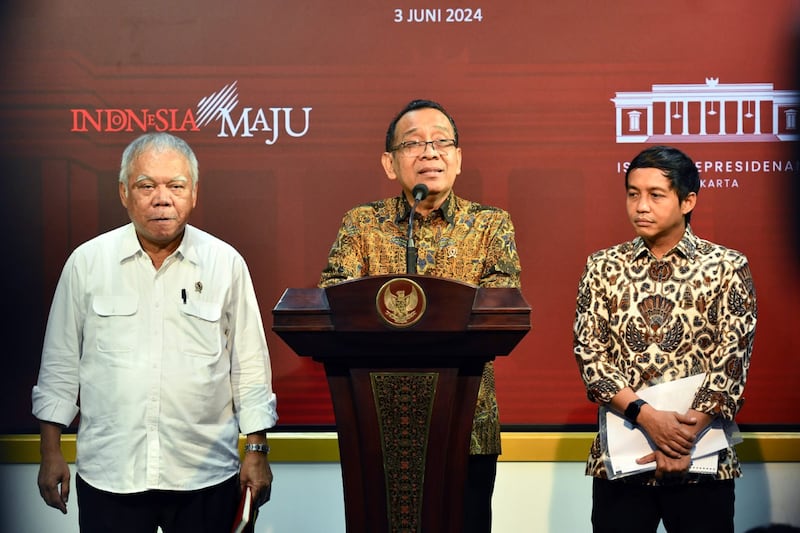Indonesia’s plan to build a new capital is in trouble after its two top officials resigned without explanation Monday, a development that may signal to investors the U.S. $32 billion project is facing serious problems, analysts said.
The relocation plan has been touted as Indonesian President Joko “Jokowi” Widodo’s legacy project before he leaves office in October. His government has accordingly planned to host high-profile Independence Day celebrations at the construction site in Borneo on Aug. 17.
But the plan to build the new capital Nusantara, which is expected to replace a crowded and sinking Jakarta, has been plagued by construction delays, land acquisition problems and struggles to attract private investment.
Now, investors could see the resignations as a sign that the Nusantara National Capital (IKN) project has severe challenges, said Mohammad Faisal, executive director of the Center of Reform on Economics (CORE).
“In addition, financing is also an obstacle … whether or not there is funding for IKN,” Faisal told BenarNews.
Some observers speculated that Jokowi had been dissatisfied with the performance of the Nusantara National Capital Authority’s head and deputy head, Bambang Susantono and Dhony Rahajoe, and that was why they resigned. Their implementation had been too slow for the president, the observers said.
But State Secretariat Minister Pratikno said at a press conference that performance was not the reason for their resignation, although he did not say why they quit.
The minister, who goes by one name, said only that the two bureaucrats had been given new assignments and that discussions on Bambang’s resignation had been on for a while.
“The conversation has been around for a long time, but the [resignation] letter is new,” said Pratikno.
BenarNews contacted Bambang and Jokowi’s spokesperson, Ari Dwipayana, for more information, but did not immediately hear back.
According to the Reuters news agency, Jokowi is scheduled to visit Nusantara on Tuesday to inaugurate several projects, including schools, like he has been doing for the past several months.
In November, he broke ground on a new international airport in the new capital, which he said would be fully operational by the end of 2024. It is located about 15 km (nine miles) from the city center and covers more than 1,700 acres (688 hectares).
In 2019, Jokowi announced his plan to relocate the capital about 1,700 km (1,000 miles) from Jakarta, citing the city’s problems with overcrowding, pollution, traffic congestion and sinking land. Expected to be completed by 2045, this city is planned to span 256,000 hectares (632,589 acres).
The government had said in late December that basic infrastructure construction for the new capital was nearly 63% complete, keeping it to the deadline of a year-end finish. This included facilities such as roads, dams, bridges and government buildings.

But a planned move to Nusantara in August of thousands of civil servants was postponed to September because residences for them were not complete, local news site Tempo reported in February.
In April, The Jakarta Post newspaper reported that the government planned to move a handful of cabinet ministers, including Basuki, to Nusantara in July, in addition to around 1,000 officials who are involved in the Aug. 17 Independence Day events.
Administrative and Bureaucratic Reform Minister Abdullah Azwar Anas said the occasion would “require a big support system, since thousands will be staying” in the nation’s new capital to attend the August celebrations, the newspaper reported.
Jokowi’s second and final term ends in October because the constitution doesn’t allow him to seek a third five-year term. His successor, President-elect Prabowo Subianto, whom he tacitly supported, has promised to continue building the capital, but whether he will is anybody’s guess.
The project has struggled to attract foreign investors who want to see progress in construction, the move by government personnel and actual action by Jokowi’s successor, analysts have said.
Meanwhile, Public Works and Housing Minister, Basuki Hadimuljono, whom Jokowi appointed as acting head of the Nusantara National Capital Authority, said the focus of his duties would be to resolve the land and investment issues at the new capital’s site in East Kalimantan province.
He said that Jokowi had also appointed the deputy agrarian minister to the authority, in the hope that the organization may find it easier to deal with land issues at site of the new capital
“The two of us will immediately decide on the status of the land in IKN, whether it is for sale, rent or PPP [public-private partnership],” Basuki said, according to a cabinet secretariat statement.
“We want to speed it up, so that investors no longer hesitate to make their investments. … because the land status will be clearer, their legal status as investors in IKN will also be clearer,” Basuki said, according to a cabinet secretariat statement.
That alone, though, may not be enough, some analysts said, suggesting the capital project lacked cohesion.
An economist from Padjajaran University, Yayan Satyakti, said that is the reason for implementation problems.
“If we look at the master plan that IKN [the new capital] currently has, it seems that the technocratic process is not very well planned,” Yayan told BenarNews.
A public policy analyst at Gadjah Mada University in Yogyakarta said that for a project of its size, it did not appear to be well thought out.
“[I]ndeed the planning of IKN as a major national project is still not fully mature,” Wahyudi Kumorotomo told BenarNews.
Nazarudin Latif in Jakarta contributed to this report.
